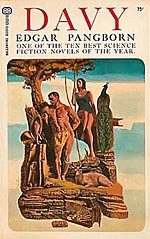
![]() couchtomoon
couchtomoon
3/5/2015
![]()
A coming of age tale set a few hundred years after a nuclear catastrophe in post-Holocaust U.S, Edgar Pangborn's 1964 Davy envisions an East Coast of ruined states (Connicut, Penn, Katskill), populated by suspicious villagers, roving caravans, and defected soldiers. Styled as a memoir, Davy, in his early adulthood, recounts life, love, and loss as he shucks his indentured servitude for a life of adventure, while his adulthood friends punctuate the narrative with occasional corrective, albeit sometimes annoying, footnotes.*
If not for the later timeline, this novel could almost be the slighter, less ambitious sibling of Leigh Brackett's 1955 The Long Tomorrow.A couple hundred years apart, Pangborn's post-apoc world closely resembles Brackett's post-apoc world, with independent townships ruled by dogmatic varieties of religion (the Holy Murican Church inDavy), and explored through the eyes of young boys on the way to freedom and adulthood. The worlds are so similar, the boys could be contemporaries (although I don't think Len and Esau would much care for Davy's bawdiness).
Yet, Brackett dissects a reemerging world grappling with the sins of the past (technology, capitalism, crowding), whereas Pangborn uses his world as a backdrop to scorn religion and display the sexual revelries of a teenage boy. Where Brackett is deft, stimulating, and moving, Pangborn is humorous, but superficial and gaudy. "Women are people, too," Davy reminds us at least twice, although his lady friends serve only as playmates for his "stallionizing."
Several potentially powerful moments are deflated, due to the author's inability to handle these moments properly. A born-again man, wrestling with his guilt as a sinner, could be powerful arc in the hands of some authors, but Pangborn's presentation is hollow, matter-of-fact. Although intended as an emotional clincher in this tale, the born-again man's ultimate fate, and the fates of others, are treated with canned drama, and have little impact on the reader. We move on.
But Davy's matter-of-factness rescues what could be just another over-romantic adventure tale. Styled in a Vonnegut-like prose, though comparably slight in its social commentary, with statements like, "Anyone is likely to be cursed for smashing a makebelieve" [146], and "She had a good deal of faith in Sam's judgment when Jed and God weren't around" [147]. Religion and prudishness get their what-for in critical statements like, "Religion requires a specially cultivated deafness to contradiction which I'm too sinful to learn" [24]. In this blaspheming manner, Davy is more a sibling to Galouye's Dark Universe, though not nearly so slick or subversive.
Most confounding, however, is Pangborn's attention to insignificant events, while bypassing the more intriguing moments of Davy's life. The narrative neglects Davy's war years, glosses over his years with a father figure, but we learn firsthand details about his first sexual experiences. (Spoiler alert: First, they did it in her bed. Then they argued. Then they did it against the wall.) Sure, sex is very important to teenagers, but a runaway servant who is also a survivor of war should have more story to tell. Perhaps the three related follow-up books to this Davy series explore more of Davy's intriguing time at sea.
Davy might seem like a minor footnote in the subgenre of post-nuclear event, Ruined Earth fiction, late to the table and with little new to offer, but Pangborn's dry, humorous tone is entertaining enough to connect with casual readers. Although Davy is not the "lovely, rollicking, provocative and musical book" that Theodore Sturgeon promises in the cover blurb, it is funny and occasionally insightful.
Recommended only for SF completionists and adolescents looking for sneaky sex scenes in novels.
*I thought you loved footnotes in fiction. ~Jonathan Strange and Mr. Norrell**
** What? Books don't talk to you?
http://couchtomoon.wordpress.com